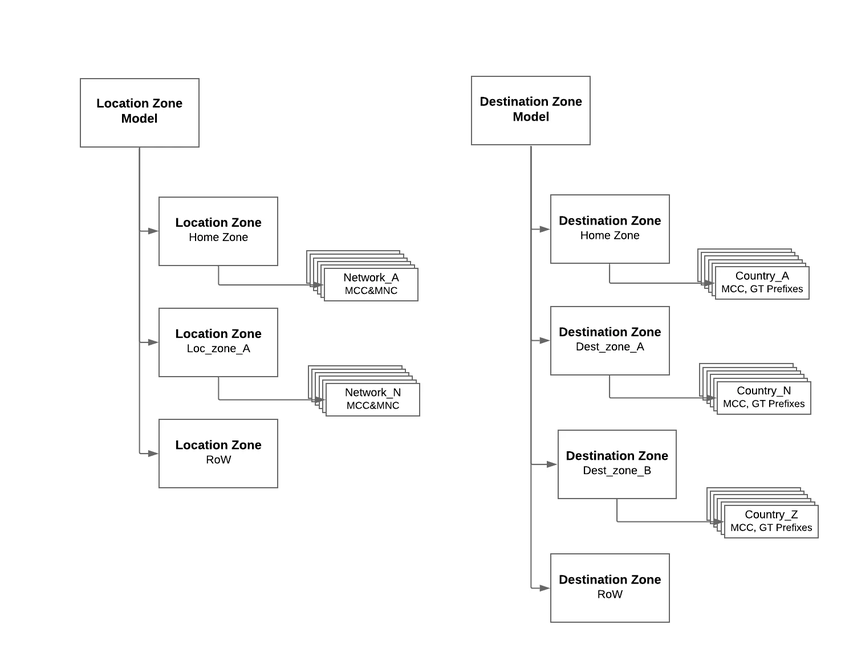Price Plans - SMS - Destination Based Rating (FT-1023.001)
About this document
Scope
This document provides background information as well as a functional description of the FT-1023.001 Price Plans - SMS - Destination Based Rating advanced feature. The described feature is supported from the release version 4.3.8 onwards.
Note
Price Plans - SMS - Destination Based Rating is an advanced feature and requires a special license. Ensure that you have agreed with Mavoco about the usage of this feature before taking it into use.
This feature is part of the Usage-based Charging functionality with number FN-1023.
Feature Availability
Feature Version | Available from | Summary of changes |
|---|---|---|
v1 | CMP Release 4.3.8 | Initial release |
Feature overview
Goals
The aim of the Zone Price Plans - SMS - Destination Based Rating feature is to allow SMS MO Destination based Rating.
A Destination Zone Model is used to support SMS destination party analysis.
Out of scope
Network Group Price Plans
Real-time service blocking for Offline CDR SMS
Functionality of the feature
Price Plans - SMS feature introduces SMS MO Destination Based Rating for all types of Zone Price Plans (Prepaid or Postpaid, and Individual or Pool).
It is possible to differentiate between incoming and outgoing SMS messages. By default, only outgoing (MO) SMS traffic is charged, it can be defined in the Price Plan whether incoming (MT) SMS should also be charged. At Zone Price Plan creation the following SMS Charge Types can be selected:
MO: Only Mobile Originated (outgoing) SMS messages are charged.
MO+MT: Mobile Originated (outgoing) and Mobile Terminated (incoming) SMS messages are charged.
Note that Destination Based Rating is only applicable to SMS MO.
Charges must be defined for the selected services, however, they can be 0.0 for free of charge.
Defining a Monthly Included value determines how many SMS messages can be sent/received in each Zone of the Zone Model within a Billing Cycle before an overage rate is applied, i.e. the Monthly Included Service is covered by the Monthly Recurring Charge (MRC) of the Price Plan.
Example
Included SMS MO for the Home Zone is set to 100 and the overage rate is $0.15/message.
The first 100 SMS MO used within the Billing Cycle will not incur a charge, but each SMS MO after the 100th will incur a $0.15 charge until the count resets to zero at the beginning of the next Billing Cycle.
CMP can charge SMS usage based on two different, selectable SMS Charge Models: Simple, and Destination based Rating. If the Charge Model Destination based Rating is selected, CMP will rate the SMS based on A Party Location (defined by the Location Zone of the SIM) and B Party Destination Zone, which is based on the Country of the B Party (MS)ISDN and not the actual location of the SIM and the time of day (Time Slice).
CMP will rate MT SMS based on the B Party SIM Location Zone, which is defined by the Location Zone in which the SIM is located and the time of day (Time Slice).
Example
If Sender (A) Party is located in AT&T Network in the USA, it is located in the Home Location Zone. Called (B) Party's MSISDN is +43xxxxxxxxxx. +43 is resolved to Austria, which is in the EU Destination Zone. Usage, in this case, will be first charged against the 5 SMS included allowance and then charged at $0.5/SMS.
The example applies with one time slice only for simplicity.
A Party Location | B Party Home Network | |||
|---|---|---|---|---|
Home Destination Zone | EU Destination Zone | MEA Destination Zone | RoW Destination Zone | |
Home Location Zone Included: 15 SMS | Overage: $0.1/SMS | Overage: $0.5/SMS | Overage: $0.75/SMS | Overage: $1/SMS |
EU Location Zone Included: 5 SMS | Overage: $0.5/SMS | Overage: $0.2/SMS | Overage: $0.75/SMS | Overage: $1/SMS |
RoW Location Zone Included: 0 SMS | Overage: $0.5/SMS | Overage: $1/SMS | Overage: $1/SMS | Overage: $1/SMS |
Destination Zone Model
A Destination Zone Model type is used to support the Destination based Rating Charge Model. The Destination Zone Model contains two or more Destination Zones, which are defined in terms of one or many countries. Destination Zone Models are created in the Resource Manager just like Location Zone Models, however, this Zone Model type is independent of the existing Location Zone Model and is used for Voice called and SMS recipient party (i.e. B) analysis.
Note:
Country and Destination Zone definition will be immutable, and cannot be changed once provisioned. If a Zone needs to be extended, a new one has to be created and used in the Price Plan definition.
Destination Zone Model has to be defined only for Price Plans that have SMS MO Charge Model set to Destination based Rating.

As the Country definition does not contain any MNC information, the GT-Prefix (Global Title) gets used, which has to be configured along all Country definitions within CMP.
A GT-Prefix is a full or partly Network Identifier (Dial Code), like:
+44 (UK)
+1 608, +1 456 (Bahamas)
In general, CMP does preload one record per Country and related GT-Prefix (if provided).
However, additional (fake) Countries can be created with different GT-Prefix, in order to cover one ‘physical’ Country with multiple ‘virtual’ Countries. Those can be easily used within a Country Zone Model to provide more complex rating models, covering not simply a full Country but dedicated Districts or even Cities for example.
Overusage Cost Cap
Overusage Cost Cap defines the maximum amount of money value, that is allowed to be charged for the total overage on the Price Plan. Overusage Cost Cap is only applicable for Postpaid Price Plans.
In case the Price Plan has a Cost Cap limit configured and the total overage costs of the Price Plan are higher than this Cost Cap within a Billing Cycle, an additional credit line is created for the cost difference between the real costs and the cap.
